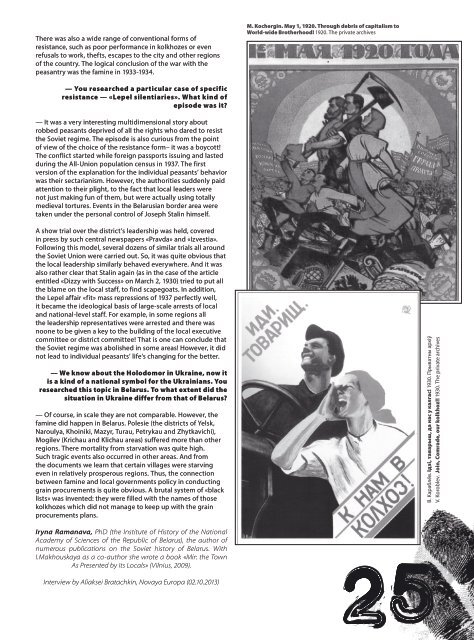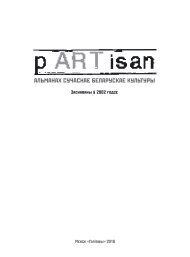pARTisan_32
You also want an ePaper? Increase the reach of your titles
YUMPU automatically turns print PDFs into web optimized ePapers that Google loves.
There was also a wide range of conventional forms of<br />
resistance, such as poor performance in kolkhozes or even<br />
refusals to work, thefts, escapes to the city and other regions<br />
of the country. The logical conclusion of the war with the<br />
peasantry was the famine in 1933-1934.<br />
M. Kochergin. May 1, 1920. Through debris of capitalism to<br />
World-wide Brotherhood! 1920. The private archives<br />
— You researched a particular case of specific<br />
resistance — «Lepel silentiaries». What kind of<br />
episode was it?<br />
— It was a very interesting multidimensional story about<br />
robbed peasants deprived of all the rights who dared to resist<br />
the Soviet regime. The episode is also curious from the point<br />
of view of the choice of the resistance form– it was a boycott!<br />
The conflict started while foreign passports issuing and lasted<br />
during the All-Union population census in 1937. The first<br />
version of the explanation for the individual peasants’ behavior<br />
was their sectarianism. However, the authorities suddenly paid<br />
attention to their plight, to the fact that local leaders were<br />
not just making fun of them, but were actually using totally<br />
medieval tortures. Events in the Belarusian border area were<br />
taken under the personal control of Joseph Stalin himself.<br />
A show trial over the district’s leadership was held, covered<br />
in press by such central newspapers «Pravda» and «Izvestia».<br />
Following this model, several dozens of similar trials all around<br />
the Soviet Union were carried out. So, it was quite obvious that<br />
the local leadership similarly behaved everywhere. And it was<br />
also rather clear that Stalin again (as in the case of the article<br />
entitled «Dizzy with Success» on March 2, 1930) tried to put all<br />
the blame on the local staff, to find scapegoats. In addition,<br />
the Lepel affair «fit» mass repressions of 1937 perfectly well,<br />
it became the ideological basis of large-scale arrests of local<br />
and national-level staff. For example, in some regions all<br />
the leadership representatives were arrested and there was<br />
noone to be given a key to the building of the local executive<br />
committee or district committee! That is one can conclude that<br />
the Soviet regime was abolished in some areas! However, it did<br />
not lead to individual peasants’ life’s changing for the better.<br />
— We know about the Holodomor in Ukraine, now it<br />
is a kind of a national symbol for the Ukrainians. You<br />
researched this topic in Belarus. To what extent did the<br />
situation in Ukraine differ from that of Belarus?<br />
— Of course, in scale they are not comparable. However, the<br />
famine did happen in Belarus. Polesie (the districts of Yelsk,<br />
Naroulya, Khoiniki, Mazyr, Turau, Petrykau and Zhytkavichi),<br />
Mogilev (Krichau and Klichau areas) suffered more than other<br />
regions. There mortality from starvation was quite high.<br />
Such tragic events also occurred in other areas. And from<br />
the documents we learn that certain villages were starving<br />
even in relatively prosperous regions. Thus, the connection<br />
between famine and local governments policy in conducting<br />
grain procurements is quite obvious. A brutal system of «black<br />
lists» was invented: they were filled with the names of those<br />
kolkhozes which did not manage to keep up with the grain<br />
procurements plans.<br />
Iryna Ramanava, PhD (the Institute of History of the National<br />
Academy of Sciences of the Republic of Belarus), the author of<br />
numerous publications on the Soviet history of Belarus. With<br />
I.Makhouskaya as a co-author she wrote a book «Міr: the Town<br />
As Presented by its Locals» (Vilnius, 2009).<br />
Interview by Aliaksei Bratachkin, Novaya Europa (02.10.2013)<br />
В. Караблёв. Ідзі, таварыш, да нас у калгас! 1930. Прыватны архіў<br />
V. Koroblev. Join, Comrade, our kolkhoz!! 1930. The private archives<br />
25





